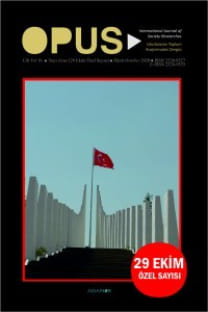Çatışma Teorisi Bağlamında Tarihsel-Toplumsal Çatışmanın Değişen Biçimleri Üzerine Bir İnceleme
Toplumsal dünya, farklılıklardan oluşmaktadır. Bu farklılıklar, farklı çıkarlar temelinde birbirinden ayrışmaktadır. Farklılıklar arasında sürekli olarak çıkar çatışması gerçekleşmektedir. Bu çatışma, toplumsal çatışmaya yol açmaktadır. Toplumsal çatışma için, yalnızca, farklı çıkarlara sahip grupların olması yetmemektedir; aynı zamanda bu farklı çıkarlara sahip grupların bunun bilincinde olması gerekmektedir. Bu bağlamda, tarihsel olarak, farklı toplumsal çatışma biçimleri gerçeklik kazanmıştır. Çatışmalar, tarihsel olarak, ekonomi, ideoloji ve politik başat biçimler almıştır. Farklı toplumsal çatışma biçimlerinin ortaya çıkmasında en önemli etken, bir ekonomik sistem olarak kapitalizmdir. Kapitalizm, toplumsal çatışmaları farklı biçimlerde şekillendirmektedir. Modern kapitalizm ortaya çıktıktan sonra toplumsal çatışma, tarihsel olarak, farklı biçimler almıştır. Bu çalışmada amaç, çıkar grupları arasındaki toplumsal çatışmaların farklı biçimlerini ortaya koymaktır. Çalışmanın hipotezi; tarihsel olarak toplumsal çatışma, sanayi devriminden 19. yy sonuna kadar ekonomi başat, 19. yy sonundan 1968’e kadar ideoloji başat ve 1968’den günümüze kadar politik başat biçimler almıştır. Çalışmanın birinci bölümünde kuramsal olarak toplumsal çatışmanın aldığı biçimler tartışılacak; ikinci bölümde kapitalizmin, siyasetin ve ideolojinin evrimi incelenecek; son olarak ise ekonomik, politik ve ideolojik toplumsal çatışmanın gelişimi ayrıntılı ele alınacaktır.
Anahtar Kelimeler:
Çatışma, Çatışma Teorisi, Toplumsal Çatışma, Ekonomik Çatışma, Politik Çatışma
An Analysis on Changing Forms of Historical-Social Conflict in the Context of Conflict Theory
Social World consists of differences. These differences distinguish in the basis of different interests each other. Continuous interests clashes realizes among differences. This clash leads to social conflict. It is not enough that there are different interest groups, at the same time, it is necessary to be conscious of different interest groups. In this context, historically, different social conflict gains reality. Conflicts had historically taken economic dominant, ideological dominant and political dominant forms. The main effect of appearance of different social conflict forms is capitalism as an economic system. Capitalism differently shapes social conflict. Social conflict after the birth of modern capitalism had historically taken different types. The aim of this study is to put forward different types of social conflicts among interest groups. The hypothesis of this study is that social conflict had historically taken economy dominant from industrial revolution to the end of 19 century; then ideology dominant from the end of 19 century to 1968; finally, politic dominant from 1968 to todays. The first part of this study is to theoretically discuss types of social conflict; the second part of this study is to analyze the evolution of capitalism, politics and ideology; the third part of this study is to elaborate progress of economic, political and ideological social conflicts.
Keywords:
Conflict, Conflict Theory, Social Conflict, Economic Conflict, Political Conflict,
___
Bartos, O. J. ve Wehr, P. (2002). Using conflict theory. Cambridge University PressBerg, A. V. D. ve Janoski, T. (2005). Conflict Theories in Political Sociology.. In ed. by T. Janoski, R. Alford, A. Hicks, M. A. Schwartz. The Handbook of Political Sociology, Cambridge University Press
Borgatta, E. F. ve Montgomery, R. J. V. (2000). Encyclopedia of Sociology v. I. New York: Macmillan
Braudel, F. ([1985] 2015). Kapitalizmin kısa tarihi. çev. İ. Yerguz.İstanbul: Say Yayınları
Collins, R. ([1975] 2009). Conflict sociology. Paradigm Publishers
Coser, L. (1956). The functions of social conflict. New York: The Free Press
Dahrendorf, R. ([1957] 1959). Class and class conflict in ındustrial society. Stanford University Press
Durkheim, E. ([1893] 2013). Division of labour in society. Palgrave Macmillan
Hobbes, T. ([1651] 1998). Leviathan. Oxford University Press
Hobsbawm, E. (1994). Age of extremes the short twentieth century 1914-1991. Abacus Book
Hobsbawm, E. ([1975] 2016). Devrim çağı 1789-1848. çev. Bahadır Sina Şener. Ankara: Dost Kitabevi
Hobsbawm, E. ([1995] 2017a). Sermaye çağı 1848-1875. çev. Mustafa Sina Şener. Ankara: Dost Kitabevi
Hobsbawm, E. ([1987] 2017b). İmparatorluk çağı 1875-1914. çev. Vedat Aslan. Ankara: Dost Kitabevi
Johnson, D. P. (2008). Contemporary sociological theory. Springer
Kazgan, G. (2016). Liberalizmden neoliberalizme neoliberalizmin getirisi ve götürüsü. İstanbul: Remzi Kitabevi
Kriesberg, L. (1973). The sociology of social conflict. New Jersey: Prentice-Hall
Kriesberg, L. (2009). Changing conflict asymmetries constructively. Dynamics of Asymmetric Conflict, 2(1), 4-22
Lenin, V. I. ([1896] 2011). Friedrich Engels.. çev. F. B. Aydar. Friedrich Engels içinde. İstanbul: Agora
Machiavelli, N. ([1532] 2008). Hükümdar. çev. N. Adabağ. İstanbul: Türkiye İş Bankası Yayınları)
Marx, K. ve Engels, F. ([1848] 2008). Komünist manifesto. çev. M. Erdost. Ankara: Sol Yayınları)
Marx, K. ve Engels, F. ([1846] 2018). Alman ideolojisi. çev. O. Geridönmez ve T. Ok. İstanbul: Kor.
Marx, K. ([1859] 1993). Ekonomi politiğin eleştirisine katkı. çev. S. Belli. Ankara: Sol Yayınları
Minogue, K. (1994). Ideology After the Collapse of Communism. In ed. A. Shtromas The End of “Isms”? Reflections on the Fate of Ideological Politics After Communism’s Collapse.,. Blackwell Publishers
Parsons, T. (1951). The social system. Free Press
Ramiah, A. A., Hewstone, M. ve Schmid, K. (2011). “Social Identity and Intergroup Conflict”. Psychol Study, 56(1), 44-52
Ross, M. H. ve Rothman, J. (1999). Theory and practice in ethnic conflict management. Palgrave Macmillan
Savur, M. (1975). Sociology of conflict theory. Social Scientist, 3(12), 29-42
Simmel, G. ([1908] 1956). Conflict. Conflict and the Web of Group Afiliations. New York: Free Press
Shtromas, A. (1997). Ideology and conflict: Does warfare between ‘ısms’ Belong to past history?. International Journal on World Peace, 14(2), 31-76
Sweezy, P. ve Baran, P. ([1966] 2007). Tekelci sermaye. çev. G. Akalın. İstanbul: Kalkedon Yayınları
Weber, M. ([1922] 2012). Ekonomi & toplum. Cilt 1, çev. L. Boyacı. İstanbul: Yarın Yayınları
- ISSN: 2528-9527
- Yayın Aralığı: Aylık
- Yayıncı: ADAMOR Toplum Araştırmaları Merkezi
Sayıdaki Diğer Makaleler
Eğitim Yönetiminde Teknoloji Kullanımına İlişkin Okul Yöneticilerinin Görüşleri
Furkan YILMAZ, Fuat GÜLLÜPINAR
Lise Öğrencilerine Yönelik Siber Zorbalık Ölçeği Geliştirme Çalışması
Ali ARSLAN, Okan BİLGİN, Murat INCE
İş Kazalarının Lojistik Regresyon Yöntemi İle İncelenmesi: Bayburt İli Örneği
Politik Bir Araç Olarak Terörizmin Kurumsallaşması: Huntington ve Giddens
Sosyal Bilgiler Ders Kitaplarında Cinsiyet Rolleri
Mutluluk Potansiyeli ve Ölçülmesi
Prof. Dr. Hasan BACANLI, Ayşe Sibel DEMİRTAŞ
